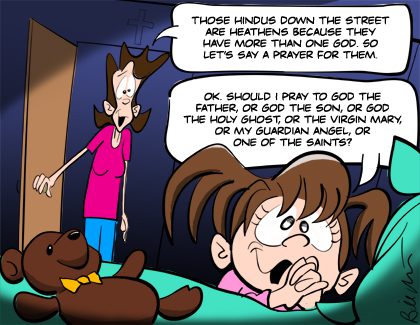
The Trinity poses interpretive problems for Evangelical Christians. Jesus is the second person of the Godhead — fully God, fully man. There was never a moment when Jesus walked upon the face of the earth that he was not God. This fact leads to contradictions and discrepancies when interpreting the gospel accounts recorded in Matthew, Mark, Luke, and John.
In John 10, we find Jesus raising Lazarus from the dead. In verse 41-42, Jesus prayed;
Father, I thank you for having heard me. I knew that you always hear me, but I have said this for the sake of the crowd standing here, so that they may believe that you sent me.
In Luke 23, we have the crucifixion of Jesus. In verses 34,46, Jesus prays:
Father, forgive them, for they do not know what they are doing. . . Father, into your hands I commend my spirit.
In the gospel of John, chapter 17, Jesus prays:
Father, the hour has come; glorify your Son so that the Son may glorify you, since you have given him authority over all people, to give eternal life to all whom you have given him. And this is eternal life, that they may know you, the only true God, and Jesus Christ, whom you have sent. I glorified you on earth by finishing the work that you gave me to do. So now, Father, glorify me in your own presence with the glory that I had in your presence before the world existed. I have made your name known to those whom you gave me from the world. They were yours, and you gave them to me, and they have kept your word. Now they know that everything you have given me is from you, for the words that you gave to me I have given to them, and they have received them and know in truth that I came from you, and they have believed that you sent me. I am asking on their behalf; I am not asking on behalf of the world but on behalf of those whom you gave me, because they are yours. All mine are yours, and yours are mine, and I have been glorified in them. And now I am no longer in the world, but they are in the world, and I am coming to you. Holy Father, protect them in your name that you have given me, so that they may be one, as we are one. While I was with them, I protected them in your name that you have given me. I guarded them, and not one of them was lost except the one destined to be lost, so that the scripture might be fulfilled. But now I am coming to you, and I speak these things in the world so that they may have my joy made complete in themselves. I have given them your word, and the world has hated them because they do not belong to the world, just as I do not belong to the world. I am not asking you to take them out of the world, but I ask you to protect them from the evil one. They do not belong to the world, just as I do not belong to the world. Sanctify them in the truth; your word is truth. As you have sent me into the world, so I have sent them into the world. And for their sakes I sanctify myself, so that they also may be sanctified in truth. I ask not only on behalf of these but also on behalf of those who believe in me through their word, that they may all be one. As you, Father, are in me and I am in you, may they also be in us, so that the world may believe that you have sent me. The glory that you have given me I have given them, so that they may be one, as we are one, I in them and you in me, that they may become completely one, so that the world may know that you have sent me and have loved them even as you have loved me. Father, I desire that those also, whom you have given me, may be with me where I am, to see my glory, which you have given me because you loved me before the foundation of the world. Righteous Father, the world does not know you, but I know you, and these know that you have sent me. I made your name known to them, and I will make it known, so that the love with which you have loved me may be in them and I in them.”
If God is a triune being, what are we to make of these prayers? If God, the Father, and God, the Son, and God, the Holy Spirit, are one, this necessarily means that Jesus is praying to himself. Outside of providing an example for his followers, there’s no possible reason for Jesus to pray. He’s the Alpha and Omega, the beginning and the end. He knows what he is going to pray before he prays and he knows what the answer will be before he utters a word. His earthly birth, life, and death were predetermined before the world began.
Of course, a better answer might be to say that Jesus was not God; that he was a son of God, a prophet, or itinerant Jewish preacher. As a human being, Jesus didn’t know what would happen in the future, so he was genuinely praying to discern the will of the Father.
Perhaps the best answer is that Jesus was known as the preacher-who-talks-to-himself. Or maybe people wondered if he was mentally ill or the eccentric son of a carpenter. Regardless, most first century people didn’t buy the notion that he was God incarnate. Jesus spent three years preaching that the kingdom is at hand. For all his preaching and miracles, most people rejected him, including members of his family. For all that Jesus allegedly did, he made very little impact on people during his lifetime.
When you see someone on a street corner or on a bus talking to themselves, what do you think? Should we view Jesus differently? I suspect that if some of us saw Jesus today “praying,” we would try to help him, as we would a drug addict or a homeless person.
Bruce Gerencser, 68, lives in rural Northwest Ohio with his wife of 47 years. He and his wife have six grown children and sixteen grandchildren. Bruce pastored Evangelical churches for twenty-five years in Ohio, Texas, and Michigan. Bruce left the ministry in 2005, and in 2008 he left Christianity. Bruce is now a humanist and an atheist.
Your comments are welcome and appreciated. All first-time comments are moderated. Please read the commenting rules before commenting.
You can email Bruce via the Contact Form.



 …before Israelite religion denied the existence of other Gods than Yahweh, it went through a phase of granting their existence but condemning their worship (by Israelites, at least; if the Moabites wanted to worship Chemosh, that was their business). In technical terms, Israelite religion reached monotheism only after a period of “monolatry” — exclusive devotion to one god without denying the existence of others.
…before Israelite religion denied the existence of other Gods than Yahweh, it went through a phase of granting their existence but condemning their worship (by Israelites, at least; if the Moabites wanted to worship Chemosh, that was their business). In technical terms, Israelite religion reached monotheism only after a period of “monolatry” — exclusive devotion to one god without denying the existence of others.